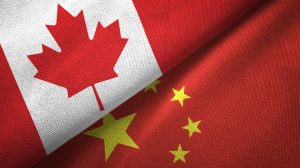“If you are sincere, we should communicate with each other in a respectful manner. Otherwise it will be hard to say what the result will be.” These were the last words that Chinese President Xi Jinping had with Canadian Prime Minister Justin Trudeau on the sidelines of the G-20 summit in Bali, Indonesia. In an exchange captured by media cameras, Xi accused Trudeau of leaking information to the press about their meeting the previous day. In response, Trudeau said that Canada believes in free, open, and frank dialogue.
The unpleasant conversation between Trudeau and Xi reflects the state of relations between Canada and China. While businesses and some individuals hope to continue their operations for profits and collaboration, the geopolitical tensions between the two countries indicate the opposite.
Initially intending to pursue a free-trade agreement with China, the Trudeau government abandoned this key diplomatic goal in September 2020. Over the past five years, the two countries engaged in multiple negative interactions on issues such as Huawei, Hong Kong, the treatment of Uyghur minorities, and critical raw materials. In the Canadian parliament, opposition parties have heavily criticized the Trudeau government for its inaction in the face of China’s increasingly aggressive behaviors and challenges to the international order.
Yet for Canada, China is no longer a file that only concerns international trade and foreign affairs. The authoritarian regime has become an aggressive actor in Canadian politics. The latest investigative stories from Canadian media outlet Global News found that China covertly funded at least 11 federal candidates in the 2019 election. The report also claimed that Canadian intelligence identified a clandestine network involving members of two major political parties, the Liberals and the Conservatives.
It is not the first time Canada has seen China attempt to interfere in Canadian democratic institutions and government entities. In 2011, Bob Dechert, a Conservative member of parliament and a former parliamentary secretary to the minister of foreign affairs, was caught sending flirtatious texts to a Xinhua News reporter suspected of engaging in espionage. In 2019, pro-China groups were present in Toronto to prevent demonstrators from protesting against the controversial extradition bill in Hong Kong. Bloomberg News also reported that pro-China agents posed as residents in attempts to spark protests to stop the extraction of rare earth minerals in the United States and Canada.
Election interference is one of the common tactics identified in China’s attempts to meddle in Canada’s political processes. In addition to making illegal campaign contributions, China has used multiple tools to influence the Canadian public, ranging from broadcasting state-sponsored propaganda on social media platforms such as Facebook and Instagram to exerting government control over China-based social media platforms such as WeChat and TikTok. The regime has also used traditional tactics, such as espionage and diplomatic coercion, as well as employing its United Front network in Canada, to advance its political agenda.
Canada can do more to protect its democratic institutions from foreign interference. Politicians, intelligence services, and policy advocates have all called on the parliamentarians to propose legislation to combat foreign interference. In the mandate letter issued to the Canadian minister of intergovernmental affairs, infrastructure, and communities, Trudeau asked the minister to lead an integrated government response to protect Canada’s democratic institutions, including the federal electoral process, against foreign interference and disinformation. However, the Canadian parliament has yet to offer concrete legislative solutions to those challenges.
While national security and combating foreign interference should be non-partisan issues, communications, policies, and actions on them could impact partisan interests, potentially impacting Liberals’ and Conservatives’ performances in future elections.
In the 2021 federal election, the Conservatives lost elections in critical districts in the Greater Toronto Area and Metro Vancouver, and consequently experienced their third defeat since 2015. Many factors contributed to the Conservatives’ defeat: The party had a leader who campaigned to “Take Canada Back,” a message that echoed U.S. President Donald Trump’s “Make America Great Again.” The right-leaning party had controversial moves on firearm regulations and barely addressed anti-Asian racism amid the COVID-19 pandemic.
Yet the “China factor” particularly stood out in the Conservatives’ 2021 defeat: While the three major political parties mentioned standing up against authoritarianism and China in their campaign platforms, the Conservatives had more proposals against China. During his leadership campaign days, Erin O’Toole, the Conservative leader during the 2021 election, advocated for policies including sanctioning the Chinese president, the premier of the State Council, the chairman of the Standing Committee of the National Party Congress, and the president of the Supreme People’s Court.
Those messages did not work well among suburban voters, particularly among voters of Chinese descent. Before the 2021 general election, the Conservatives received significant support among Chinese-language voters. Since 2015, electoral districts such as Richmond Centre and Markham Unionville, where more than 60 percent of eligible voters self-identified as people of Chinese descent, had elected Conservative MPs. But in 2021, the Conservatives lost both seats to the Liberals.
O’Toole blamed foreign interference for his defeat. But following the election results, the Chinese Canadian Conservatives Association, a grassroots political organization under the Conservative Party of Canada, called on the former Conservative leader Erin O’Toole to resign for his anti-China messages.
To combat foreign interference activities, Canada should update the needed legislation and its criminal code to ensure that intelligence and law enforcement authorities can identify and indict malicious actors engaging in foreign interference. The Canadian government should also invest more in its intelligence agencies and improve media literacy, particularly among vulnerable groups and in non-official language content.
At the same time, the Trudeau government needs to ensure that the new legislation does not isolate specific community groups or spark hatred and prejudice. The government should also continue its commitment to diversity, inclusion, and positive immigration policies to remain competitive in the global economy.

































